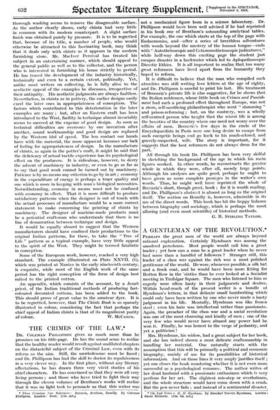THE CRIMES OF THE LAW.*
DR. COLEMAN PinuarsoN gives us much more than he promises on his title-page. He has the sound sense to realize that the healthy reader would revolt against undiluted chapters on the distasteful subject of the Criminal Law, even with its reform as the aim. Still, the unwholesome must be faced ; and Dr. Phillipson has had the skill to doctor its repulsiveness in a very clever way. In the first place, without any literary affectations, he has drawn three very vivid studies of his chief characters. He has convinced us that they were all very living persons ; and those who have tried to fight their way through the eleven volumes of Bentham's works will realize that it was no light task to persuade us that this writer was
• Three Criminai !ate Reformers : Beccaria, Bentham, Romilly. By Coleman Phillipson. London: Dent. [18s. net.)
not a mechanical figure born in a science laboratory. Dr. Phillipson would have been well advised if he had reprinted in his book one of Bentham's - astounding analytical tables. For example, the one which starts at the top of the page with Eudaemonics, and—after a series of breathless ad-ventures with words beyond the mastery of the human tongue—ends with " Autothetoscopic and Catanomothetoscopie judicatures," while half-way down this exciting page the student just escapes disaster in a backwater which led to Aplopathoscopic Dimstic Ethics. It is all important to realize that.too many great reformers have lived apart from the humanity they hoped to reform.
It is diffieult to believe that the man who compiled such atrocities was still writing love letters at the age of eighty, and Dr. Phillipson is careful to print his last. His treatment of Beccaria's private life is also suggestive, for he shows that the Italian nobleman, whose little book on Crimes and Punish- ment had such a profound effect throughout Europe, was not a stern, self-sacrificing philanthropist who went " slumming " and prison-reforming ; but, on the contrary, was a wholly self-centred person who tanght that the wisest life is among the beauties of the country where one need not worry over the affairs of men. -Beccaria's few days in the circle of the Encyclopaedists in Paris were one long desire to escape from such energetic beings and go back to his much-adored, and gravely-suspected, wife. The story is important, for it suggests that the best reformers do not always dress for the part.
All through his book Dr. Phillipson has been very skilful in sketching the background of the age in which his main figures worked. In .other words, he reconstructs the greater whole in which they were, after all, merely large points. Although his analyses are quite good, perhaps he ought to have given us more complete passages in the writer's own words. Thus, he might well have reprinted the whole of Beccaria's short, though great, book ; for it is worth reading, and Dr. Phillipson's abstract is almost as long as the original itself. The section on Rornilly is, however, admirable in its use of the direct words. This book has hit the happy balance between biography and sociology, which is perhaps the most alluring (and even most scientific) of historical methods.
G. R. STIRLING TAYLOR.


























































 Previous page
Previous page